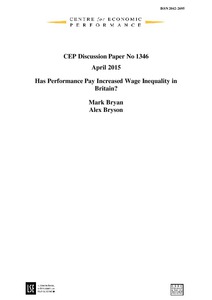Has performance pay increased wage inequality in Britain?
"Using data from the British Household Panel Survey (BHPS) we show performance pay (PP) increased earnings dispersion among men and women, and to a lesser extent among full-time working women, in the decade of economic growth which ended with the recession of 2008. PP was also associated with s...
| Main Authors: | , |
|---|---|
| Institution: | ETUI-European Trade Union Institute |
| Format: | TEXT |
| Language: | English |
| Published: |
London
2015
LSE |
| Subjects: | |
| Online Access: | https://www.labourline.org/KENTIKA-19113371124919315539-Has-performance-pay-increased-.htm |
| Summary: | "Using data from the British Household Panel Survey (BHPS) we show performance pay (PP) increased earnings dispersion among men and women, and to a lesser extent among full-time working women, in the decade of economic growth which ended with the recession of 2008. PP was also associated with some compression in the lower half of the wage distribution for women. The effects were predominantly associated with a broad measure of PP that included bonuses. However, these effects were modest and there is no indication that PP became increasingly prevalent, as some had predicted, over the decade prior to recession." |
|---|---|
| Physical Description: | 44 p. Digital |

